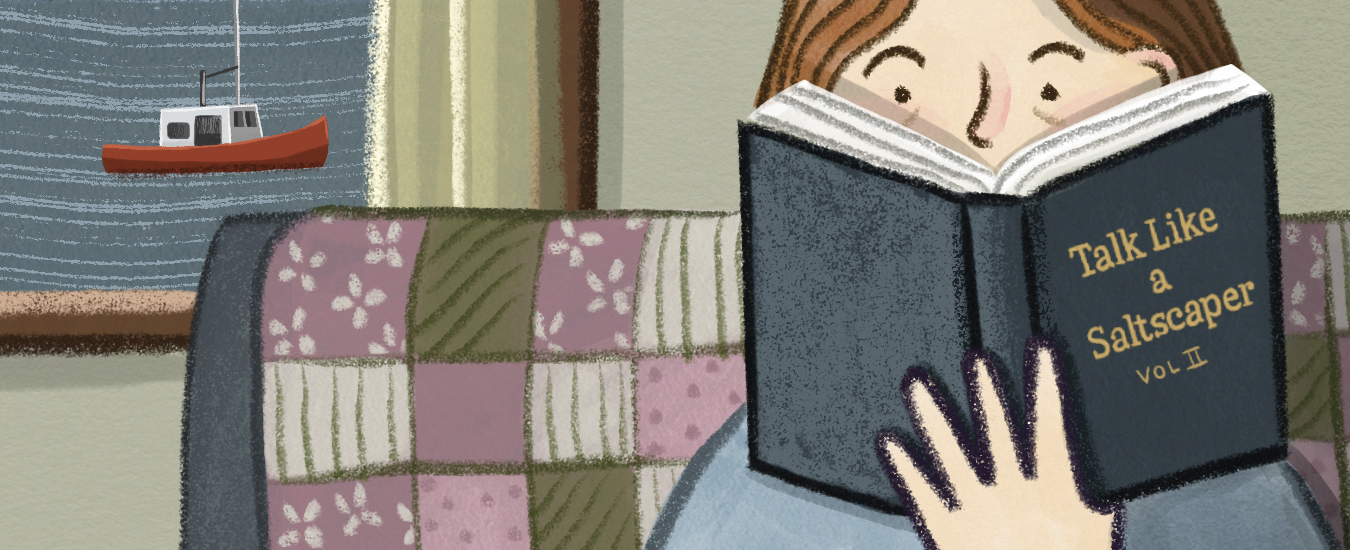Every region in the world has its own distinct linguistic shorthand. Our language and the words we speak are an intricate part of our culture; a part of the fabric that makes us uniquely Saltscapers.
Just check out this gem: “Jeet?” — did you eat yet? Or how about this one: “Giv’er” to go really fast or work really hard. And how about this catchall word: “Whatnot,” everything else.
The language we use is composed of words, phrases and expressions that are nurtured and given meaning over time. The words we speak informs who we are as a distinct people and provide us with a common thread that, whether we know it or not, binds us together.
Atlantic Canada is blessed with a rich language, highlighted with words and expressions that vary from province to province, from county to county, and from fishing port to farm town. It’s freely used in both rural and urban centres and uttered without hesitation or second thought. Our language flows from the tongue as naturally as the waves that lap our shores.
Listen carefully when a Saltscaper speaks and if you are really lucky, you may be left scratching your head and wondering what in the heck you’ve just heard. Sometimes the words are so delightfully twisted and off the cuff, the word or phrase turned on its ear, that it may baffle even lexicographers.
“Titch,” a measurement equal to a pinch or a drop, is one of my favourite words in the Saltscaper vocabulary. “Suppa” is a masterful word that only a Saltscaper would understand; it means supper. Of course, you know “rate” means “right” to a Saltscaper and “owly” means “cranky” and “lord liftin’” is an expression of exasperation.
 Language derives from many sources, passing down from one generation to the next. Some of the modern expressions that are now second nature to us were actually born in the fertile mind of Nova Scotian writer and judge, Thomas Chandler Haliburton (1796-1865), whose abilities as a writer were said to have inspired Mark Twain.
Language derives from many sources, passing down from one generation to the next. Some of the modern expressions that are now second nature to us were actually born in the fertile mind of Nova Scotian writer and judge, Thomas Chandler Haliburton (1796-1865), whose abilities as a writer were said to have inspired Mark Twain.
There’s little question that Haliburton took inspiration from ordinary folks in Nova Scotia. He may have even pilfered some of their phrases and made them his own.
Historians say Haliburton coined such verbal gems as: “it’s raining cats and dogs,” “honesty is the best policy,” “the early bird gets the worm,” “an ounce of prevention is worth a pound of cure,” and “jack of all trades and master of none.”
Who else but a Nova Scotian could take words like “some” and “nice” and use them as adjectives and adverbs? We proudly do that without hesitation or second thought. For example, you can say, “That’s a right nice vessel,” or “That’s some nice vessel,” but you wouldn’t say, “That’s a right vessel.”
Today these phrases slip freely from our lips, but Nova Scotians are also quite capable of improving the English language all on our own, as are people born and raised in Newfoundland and Labrador, New Brunswick, and Prince Edward Island.
To illustrate, let’s look at one common phrase from each of the Atlantic provinces.
In Nova Scotia, it’s common to say: “Can’t win for losing.” Its meaning: “Having a streak of bad luck.”
In Newfoundland and Labrador, you’ll hear: “The arse is gone out of ’er.” When it comes right down to it, the meaning of that phrase should seem obvious: “It’s all gone to hell.”
People from New Brunswick are fond of: “What’re you saying?” Its meaning is pretty basic, “What’s up?”
People raised on Prince Edward Island say: “Talk of dirt comin’.” The meaning seems fairly obvious, a warning that bad weather is on its way.
So, it’s simple. If you want to talk like a Saltscaper, first listen to what’s being said then repeat the words just as you heard them.
No. Don’t hesitate and don’t think about it too much. Just let it fly, for it is the purest form of “free speech” you’ll find anywhere in this country.
